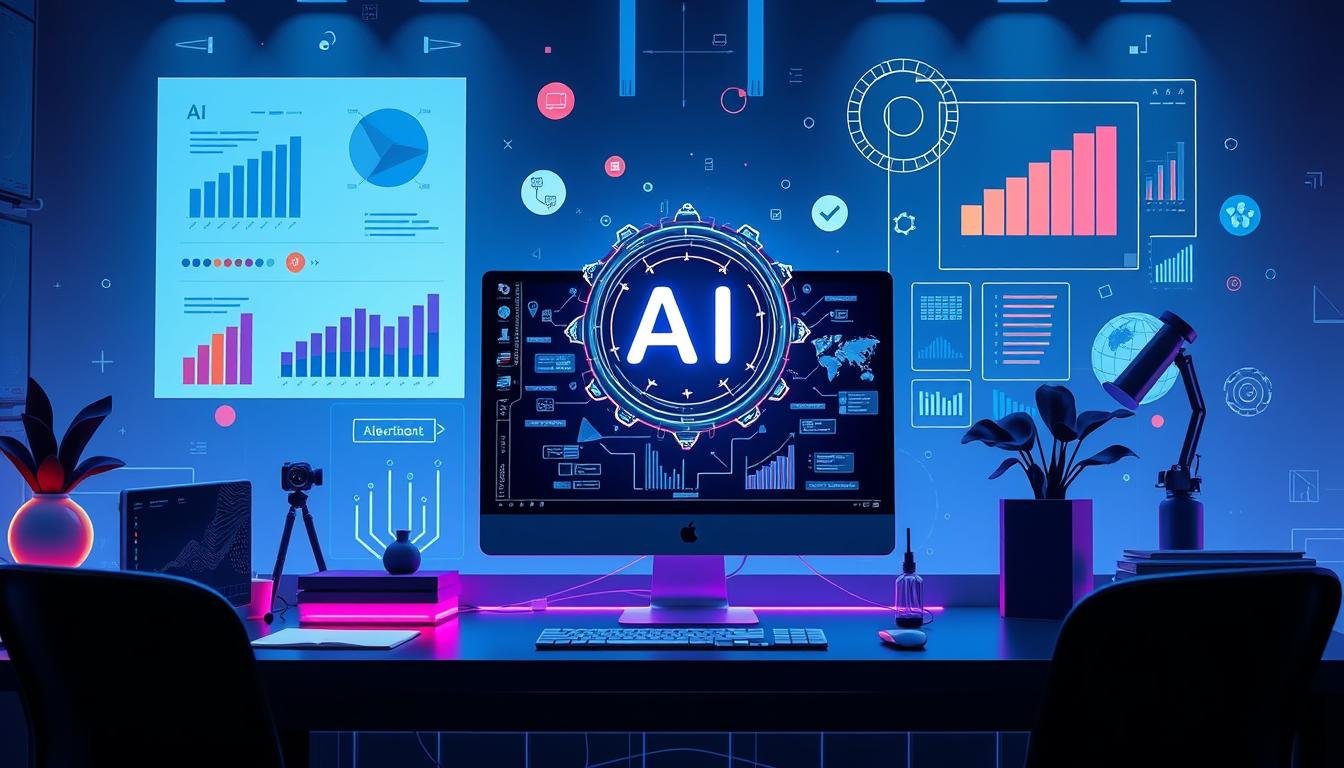Did you know that nearly 28% of Search Engine Results Pages (SERPs) featured AI Overviews as of December 2024? This shows how much AI is changing digital marketing. It’s key to use AI well to make our content better.
AI brings new tools like natural language processing and machine learning. These help us make our content more engaging and easier to find online. By using AI, we can make smarter choices and improve how our content performs. It’s all about using AI to connect better with our audience and enhance their experience.
Understanding AI in Content Optimization
Artificial intelligence in content marketing has changed the game. It’s how companies now engage with customers and create content. AI automates tasks and improves data analysis, helping marketers create content that connects with people.
What is AI in Content Marketing?
AI in content marketing uses algorithms and machine learning. It helps with content creation and distribution. This includes analyzing trends, optimizing content, and personalizing strategies.
- Analyze large volumes of content for trends and insights.
- Optimize content based on user intent and preferences.
- Implement personalization strategies for better engagement.
Now, over 25% of search results are AI-generated summaries. AI algorithms focus on content that meets user needs. Tools like Frase.io and Surfer SEO help with keyword use and readability, boosting search rankings.
How Does AI Analyze Content?
AI uses different methods to check and improve content. It looks at readability, finds relevant topics, and studies competitors. Predictive analytics also help, making content better based on past data.
AI-driven sentiment analysis helps me understand audience reactions. This lets me tailor messages better. By using these tools, I can make content fit different platforms, improving engagement and conversion rates.
The Importance of Data-Driven Insights
In the world of content marketing, using data is key. It helps me create strategies that really connect with people. Knowing how to use these insights is vital for making great content.
Benefits of Using Data in Content
Using data has many benefits, like making content better and more relevant. Here are some main advantages:
- Improves decision-making: Data helps me make choices that match what people want and need.
- Refines targeting: It gives me insights into who my audience is, so I can send them the right messages.
- Enhances customer satisfaction: By looking at how users behave and what they say, I can make content that they love.
- Optimizes resources: Data helps me find ways to work better and use my time and money wisely.
Key Metrics to Monitor
It’s important to keep an eye on how well my content is doing. Here are some key metrics to watch:
- Conversion rates: This shows how well my content is getting people to take action, like signing up or buying something.
- Bounce rates: This tells me if my content is keeping people interested, or if they’re leaving quickly.
- Content engagement: This shows how people are interacting with my content, helping me see what they like best.
Identifying Target Audience with AI
Finding and understanding my target audience is vital for better content engagement. I use advanced AI tools for audience analysis. These tools help me learn about demographics, behaviors, and preferences. This way, I can create content that really speaks to my audience.
Tools for Audience Analysis
AI audience analysis tools quickly process huge amounts of data. They give me insights that help shape my marketing plans. Here are some tools I find useful:
- ExactBuyer helps in creating realistic, targeted buyer personas for businesses.
- Pixis AI identifies niche audiences by forming custom cohorts based on search trends.
- HubSpot’s Breeze AI refines and optimizes social media strategies through data analytics.
- GapScout offers insights to help brands tap into often overlooked market needs.
- Userpersona generates user personas based on product descriptions to inform brand strategies.
Creating Personas Using AI
Creating marketing personas helps me tailor content for different groups. AI makes this process better. For example, predictive analytics help predict future consumer behaviors. This way, I can make content that’s just right for my audience.
Let’s say a fashion retailer wants to target career-oriented women aged 28-35 who care about sustainable fashion. AI helps me get this specific. It shows how AI improves marketing by focusing on the right audience.
Content Creation: AI Tools and Techniques
In today’s digital world, AI tools for content creation are a game-changer. They make my work more efficient and creative. AI writing assistants help me write better without losing my personal touch. They’re great for boosting SEO while keeping content engaging.
AI-Powered Writing Assistants
AI writing assistants are key to my content-making process. They do many things, like:
- Grammar correction
- Spell checking
- Phrasing updates
- Tone consistency
- Semantic search capabilities
Using AI for content creation helps me connect with my audience. It also makes older posts better, which helps them rank higher in search results.
Enhancing Creativity with AI
AI doesn’t just make things easier; it also boosts creativity. When I’m stuck, AI tools offer new ideas and improve drafts fast. This lets me explore different topics, from blogs to marketing materials.

As I write, AI suggests ways to make my content better. It recommends using bullet points and shorter paragraphs. These tips not only please readers but also search engines, improving my SEO. Working with AI, I create stories that engage and convert.
Optimizing SEO with AI
Using AI in SEO can change how marketers work. AI tools help find important keywords for better rankings. They look at competition, helping create strategies that follow SEO best practices.
AI-Driven Keyword Research
AI keyword research is key today. Tools like Semrush and Surfer SEO help find and check keywords. They analyze big data to find valuable keywords and trends.
This saves time and focuses on keywords that boost visibility. AI, like GPT-4 and Google’s BERT, also checks search intent. This makes sure content meets user needs and targets the right keywords.
Content Structuring for SEO
Organizing content well is vital for SEO with AI. AI-generated schema markup helps search engines understand my pages. This increases the chance of rich snippets in search results.
AI tools also suggest links for a strong link ecosystem. By keeping titles, headers, and descriptions short, I meet search engine needs and engage users.
Enhancing Readability and Engagement
Good content is not just about the info; it’s how well it’s shared. I use AI to make my content easier to read and more engaging. This way, people spend more time on my site, which is a good sign.
AI Tools for Writing Style Improvement
AI makes complex writing simple, helping more people understand it. The benefits include:
- Automated Readability Analysis: AI checks how hard my writing is, using tools like the Flesch-Kincaid Reading Ease. This helps me make my content better.
- Simplification Suggestions: AI offers simpler words and shorter sentences. This keeps the meaning clear and easy to follow.
- Paragraph Structuring: AI helps me break text into shorter paragraphs. This keeps readers interested and focused.
Utilizing AI for Content Personalization
Personalizing content is key to keeping readers interested. AI lets me tailor content to what users like and how they behave. This can lead to:
- Adaptive Content Complexity: AI changes the writing style to fit the reader’s level of knowledge. This makes reading more enjoyable.
- Dynamic Internal Linking: AI helps me link to other articles that are relevant. This encourages readers to explore more.
- Multimedia Enhancement: Using videos and infographics keeps readers engaged. This can also help my site rank better in search results.
AI lets me make quick changes to improve readability. By using AI insights, I can adjust my content fast. This keeps my audience interested and coming back for more. By focusing on clear calls-to-action and fast page loading, I create a great user experience. This boosts engagement and quality of my content.
Automating Content Distribution
In today’s digital world, making my content work harder is key. Using AI to schedule posts helps me share content on time across many platforms. This way, I can focus more on planning and creativity, not just posting.
Scheduling and Posting with AI
AI scheduling tools are changing how I post content. They help me set the best times for my posts and reach more people. The main benefits are:
- Posting when most people are online
- Posting lots of content at once for big campaigns
- Adjusting posts based on what my audience likes
Automating my content doesn’t just save me time. It also makes my content more visible. With analytics, I can improve my strategies. Predictive analytics helps me guess how well my content will do.
Monitoring Engagement Metrics
Keeping an eye on how people interact with my content is vital. By looking at things like website visits and sales, I can see what works best. This lets me:
- Find out which channels are most effective, like social media
- Change my plans based on what people are saying
- Make content more personal for each user
This ongoing check helps me tweak my content plans. This way, every piece of content can have the biggest impact and keep customers happy.
The Role of Machine Learning in Content
Machine learning is key in making content better by understanding what users like. It uses smart algorithms to help marketers make content that people want to see. This way, content can be made just for the audience, and strategies can change as new insights come in.
How Machine Learning Improves Recommendations
Machine learning looks at lots of data to find patterns. For example, AI can see how users interact with content. This helps marketers suggest content that users will like more.
When content is made just for someone, they tend to stick around more. Companies that use machine learning see big wins. They get:
- Users who like what they see more
- Content that hits the right audience
- More people clicking on what they see
- More people finding their content online
Adapting Content Strategies Over Time
Machine learning helps brands change their content plans as needed. This is important because what people like changes fast. AI tools watch how content does and help make changes fast.
Using machine learning brings big benefits. It helps content get better over time. It gives insights on what users like. It makes content personal in real-time. And it helps stay ahead of the competition.
- Content gets better with time thanks to AI checks
- Insights from user behavior help make better plans
- Content that matches what users want right now
- Staying ahead in the market with smart data use

Ethical Considerations with AI Content
Exploring AI in content creation, I see the need to talk about ethics. Ethical AI content practices are key to using it right. They help avoid risks and build trust. I focus on two main areas: avoiding plagiarism and being clear about AI content.
Avoiding Plagiarism and Duplicate Content
One big ethical issue is making sure content is original. AI content must be unique and well-made. Companies must prevent AI from copying copyrighted material.
Using diverse training datasets helps avoid plagiarism. This way, AI content is ethical and original.
Transparency in AI-Generated Content
Being open about AI content wins trust. People should know how AI affects what they see. By sharing how AI tools work, I show accountability.
This openness builds better relationships with audiences. It shows they can trust how their data is used.
Future Trends in AI for Content Optimization
Looking ahead, AI will change content marketing a lot. New AI tools are making content creation, optimization, and sharing better. Knowing these changes is key to using AI well in content plans.
Emerging Technologies to Watch
AI is getting smarter fast. It can quickly sort through lots of data to find trends. This helps with finding the right keywords and making content better.
Some new AI tools to watch include:
- AI-Powered Content Generation: Tools that come up with ideas, outlines, and drafts. They focus on the right keywords and what people like.
- Enhanced Keyword Research: AI finds important keywords and long-tail keywords. It also spots gaps in what competitors are doing.
- Dynamic Content Structuring: AI organizes content in a way that’s easy to read and search engines like.
- Personalized Content Recommendations: Algorithms suggest content based on what each person likes. This makes people more engaged.
Preparing for AI’s Impact on Marketing
To succeed in marketing, I need to get used to AI’s changes. Preparing for AI means focusing on a few key areas:
- Updating SEO strategies to match AI’s focus on what users want and content quality.
- Switching to measuring content by how well it engages people, not just clicks and rankings.
- Investing in AI tools to make work more efficient. Studies show companies could see a 40% boost in productivity.
- Keeping a consistent brand voice across all platforms. This makes sure the message is clear and connects with people.
Measuring Success in AI-Optimized Content
As marketers, knowing how to measure content success is key. With AI in content optimization, setting clear KPIs is vital. By setting goals and using analytics tools, I can track and improve my content strategies.
Key Performance Indicators (KPIs)
Key performance indicators guide me in checking my AI content’s success. Important KPIs include:
- Engagement Rates: High engagement shows the content hits the mark.
- Conversion Rates: Seeing how many users act helps measure success.
- Bounce Rates: A low bounce rate means visitors find the content useful.
- SEO Performance: Watching search rankings and organic traffic shows content visibility.
Tools for Analyzing Content Performance
Using the right tools for content analysis helps me see AI content’s impact. Some useful tools are:
- Google Analytics: Crucial for tracking website performance and user actions.
- Grammarly: Helps check content quality and readability.
- Yoast SEO: Optimizes content for search engines and boosts on-page SEO.
- MarketMuse: Gives insights into content gaps and improves topic relevance.
By using these tools and understanding KPIs, I can make sure my AI content engages, boosts conversion rates, and meets marketing goals. Keeping an eye on these factors helps me refine my content strategies. This leads to better results and growth.
Case Studies: Success Stories in AI Optimization
Looking at real-world examples of AI content optimization shows its huge promise. Top brands in different fields have used AI to boost engagement and performance. By studying these successes, we can learn valuable lessons to improve our own strategies.
Lessons Learned from Leading Brands
The fintech market grew to $42.83 billion in 2023 and $44.08 billion in 2024. This shows AI’s power in areas where data matters a lot. Gartner’s report also points out that 76% of HR leaders think not using AI could hold them back.
Practical Applications and Results
In healthcare, AI is expected to jump from $20.9 billion in 2024 to $48.4 billion by 2029. This huge growth shows AI’s role in better patient care and health results. In e-commerce, AI is set to rise from $5.81 billion in 2022 to $22.60 billion by 2032.
These numbers show how AI can make a big difference. Tools like ClickUp and GravityWrite are changing how businesses create and manage content. They help keep companies ahead in the fast-changing digital world.
FAQ
What is AI in Content Marketing?
How does AI analyze content?
What are the benefits of using data in content?
What key metrics should I monitor for content performance?
How can AI assist in identifying my target audience?
What are AI-powered writing assistants?
How can I optimize my SEO using AI?
What tools can improve writing style and readability?
How does AI automate content distribution?
How does machine learning enhance content recommendations?
What ethical considerations should I keep in mind when using AI?
What future trends should I watch for in AI content optimization?
What are the key performance indicators (KPIs) for measuring content success?
Can you provide examples of successful AI optimization?
Source Links
- Content Optimization with Ai: 10 Effective Approaches (2024) – https://getgenie.ai/content-optimization-with-ai/
- How to Rank in AI Search Results: 9 Effective Strategies – https://xponent21.com/insights/optimize-content-rank-in-ai-search-results/
- AI Content Optimization: A Guide on Getting Started – https://www.webfx.com/blog/content-marketing/ai-content-optimization/
- How To Optimize Content for AI Search | Rival Digital – https://rivaldigital.com/blog/seo/how-to-optimize-content-for-ai-search/
- The AI-Driven Approach to Content Optimization: Boosting Visibility, Engagement, and ROI. – https://www.linkedin.com/pulse/ai-driven-approach-content-optimization-boosting-roi-thabiso-ngcobo-8ejpe
- AI and SEO: Optimizing Your Website with Artificial Intelligence – https://www.linkedin.com/pulse/ai-seo-optimizing-your-website-artificial-intelligence-stratablue-u3ube
- How to Integrate AI with Data Analytics: Best Practices for Enhanced Insights | Alation – https://www.alation.com/blog/how-integrate-ai-data-analytics-best-practices/
- Data-driven Design Decisions: Using AI Insights to Optimize User Interfaces – https://www.linkedin.com/pulse/data-driven-design-decisions-using-ai-insights-optimize-ifeanyi-nijfe
- Data-Driven Decision Making: Harnessing Analytics for Success – Best Practice Institute – Blog – https://blog.bestpracticeinstitute.org/data-driven-decision-making-harnessing-analytics-for-success/
- AI Target Audience: What I Learned [+ Tools to Try] – https://blog.hubspot.com/marketing/ai-target-audience
- AI-Powered Precision: 5 Strategies to Pinpoint Your Target Audience – https://www.linkedin.com/pulse/ai-powered-precision-5-strategies-pinpoint-your-target-audience-7yise?trk=public_post
- Identify your target audiences in B2B Marketing with AI: A strategy for success – https://gotoclient.com/en/blog/identify-your-target-audiences-in-b2b-marketing-with-ai-a-strategy-for-success/
- AI in Content Creation and Optimization: Write Smarter, Not Longer – https://level343.com/search-marketing-articles/ai-in-content-creation/
- 12 Best AI Tools to Use for Content Creation in 2025 – https://www.getblend.com/blog/10-best-ai-tools-to-use-for-content-creation/
- How to Power Your SEO Content With AI – https://www.webfx.com/blog/marketing/how-to-seo-content-ai/
- Council Post: How To Leverage Artificial Intelligence To Improve SEO – https://www.forbes.com/councils/forbesagencycouncil/2024/11/14/how-to-leverage-artificial-intelligence-to-improve-seo/
- 9 Tips on Optimizing Content for Dwell Time SEO – Originality.AI – https://originality.ai/blog/dwell-time-content-optimization-tips
- How to Enhance Readability with AI – Emplibot – https://emplibot.com/how-to-enhance-readability-with-ai/
- How to Use AI and Automation to Optimize Your Global Content – – https://vistatec.com/how-to-use-ai-and-automation-to-optimize-your-global-content/
- Maximizing Reach and Engagement: AI-Powered Distribution Strategies for Your Content – https://aicontentfy.com/en/blog/maximizing-reach-and-engagement-ai-powered-distribution-strategies-for-content
- How to Automate Content Creation with AI | ClickUp – https://clickup.com/blog/how-to-automate-content-creation/
- The role of AI in content optimization – https://aicontentfy.com/en/blog/role-of-ai-in-content-optimization
- Understanding How AI Can Optimize Content Structuring – https://www.nobledesktop.com/learn/digital-marketing/understanding-how-ai-can-optimize-content-structuring
- How Artificial Intelligence Is Revolutionizing SEO Strategies – Regan Communications Group – https://regancomm.com/how-artificial-intelligence-is-revolutionizing-seo-strategies/
- Navigating the ethical landscape of AI content creation – https://www.ust.com/en/insights/navigating-the-ethical-landscape-of-ai-content-creation
- The Ethics of AI in Content Creation: What Marketers Need to Know – https://aicontentfy.com/en/blog/ethics-of-ai-in-content-creation-what-marketers-need-to-know-1
- AI for SEO: Your Guide for 2024 – https://www.salesforce.com/eu/marketing/ai/seo-guide/
- Mastering AI in search: Best practices and future trends – https://searchengineland.com/mastering-ai-search-best-practices-future-trends-444538
- Optimizing AI Content: A Comprehensive Guide – AI Digital Marketing Agency – https://matrixmarketinggroup.com/optimizing-ai-content/
- AI Content Marketing Mastery: Tools, Tips, and Strategies for Success – https://www.vendasta.com/blog/ai-content-marketing/
- Evaluate AI-Generated Content: Best Practices & Quality Tips – https://divvyhq.com/content-automation/how-to-evaluate-ai-generated-content/
- AI in Action: 6 Business Case Studies on How AI-Based Development is Driving Innovation Across Industries – https://appinventiv.com/blog/artificial-intelligence-case-studies/
- 10 Best AI Case Study Generators to Boost Your Content Strategy – https://clickup.com/blog/ai-case-study-generators/



